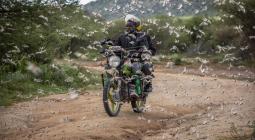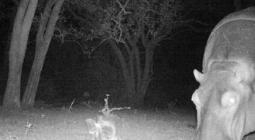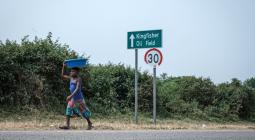Jobs gone, investments wasted: Africa's deserted safaris leave mounting toll.
MABARHULE, South Africa - When Khimbini Hlongwane spent most of his small safari tour company’s savings on the deposit for a new minibus in February, it seemed like a safe bet.
His revenues had doubled in the previous year. And bookings by American, British, and Brazilian tourists hoping to catch a glimpse of elephants, giraffes and lions at South Africa’s famous Kruger National Park were up.
Now, with borders closed and airlines grounded due to the COVID-19 pandemic, Africa’s multi-billion-dollar safari industry is unravelling and he can no longer afford the payments on the new 21-seater, which sits collecting dust in the parking lot.
“It hasn’t moved since the day we bought it,” said Hlongwane, who has been forced to stop paying the salaries of his five employees. “We could’ve been using that money to survive right now.”
From Kenya’s Masai Mara to the Okavango Delta in Botswana, rural communities that depend on safaris for income are seeing their livelihoods and dreams shattered. Hundreds of thousands of people rely on the sector, not to mention their dependents.
A slump in tourist dollars has hit conservation projects hard. And even as countries around the world loosen lockdowns, game parks, lodges and travel agencies face a grim future.
The safari industry generates some $12.4 billion in annual revenues for South Africa, Botswana, Kenya, Rwanda, Tanzania Uganda and Zambia - Africa’s top wildlife tourist destinations - according to an estimate by SafariBookings.
But a survey of over 300 tour operators conducted by the online safari travel platform this month showed that almost 93% reported a drop in bookings of at least 75% due to the pandemic. Cancellations have also spiked, the majority of them said.
‘HOW LONG CAN WE CARRY ON?’
Leon Plutsick’s Distinctly Africa lodge on the Manyeleti private game reserve bordering the Kruger National Park had been full in March.
Today, his employees are sitting at home and baboons have ransacked his unstaffed kitchen.
“We’re getting to a point where we have to ask ourselves how long do we carry on?” he said. “A lot of us are living on reserves just to survive.”
Plutsick is not alone.
A survey of close to 500 businesses in the Kruger Lowveld district - South Africa’s safari heartland - conducted by the local tourism agency last month, found 90% believed they would not survive even if international borders opened immediately.
Over two-thirds of them have laid off employees.
The lack of tourist dollars is forcing wildlife projects across Africa to make cuts, and beyond the human cost, conservationists worry that growing desperation in rural communities hit by COVID-19 could fuel a wave of poaching. [nL8N2BU6UB]
Three popular game parks in South Africa recently dehorned dozens of rhinos as a preventative measure, hoping that it would make them less attractive targets for poachers. [nL8N2DH1TT]
In Mabarhule, a community on the edge of Kruger National Park, roughly half of residents were already jobless before the pandemic.
Freelance workers like Sipho Nkosi - a tour guide and father of four who typically makes around 550 rand ($33) per tour - have found themselves without a safety net.
“We’d saved some money. But its running out, so we’ll start starving,” said Nkosi, standing outside a half-completed community hall that was being built using tourist donations.
‘A BIGGER HOLE?’
The Madilika Craft Centre sits so close to the boundary of the Kruger National Park that lions can sometimes be heard roaring in the distance.
A layer of dust now coats the pink walls of the women’s cooperative, which shut when the private game lodges where it sold its traditional Xitsonga beaded jewellery closed down in March.
Now, with her income gone, co-founder Jane Mashele is hoping the sweet potatoes and spinach in her garden will be enough to feed her four orphaned grandchildren.
“We started the centre because we were tired of sitting at home with no jobs,” she said. “This is terrible.”
In South Africa, which has recorded the most COVID-19 cases of any African nation, Tourism Minister Mmamoloko Kubayi-Ngubane warned parliament last month that up to 600,000 jobs were at risk if the sector remained shut until September.
Governments’ relief initiatives - like South Africa’s offer of 50,000 rand ($3,000) one-time grants to small tourism businesses - will do little to staunch the losses, some operators said.
In the face of looming financial calamity, the Tourism Business Council of South Africa - the industry’s lobby group - is pushing for international tourism to resume as early as September.
With the pandemic’s peak on most of the continent still predicted to be months away, that appears unlikely.
South Africa’s government has instead said regional and international tourism are only expected to resume next year.
Kenya, Namibia and Rwanda also remain closed to international visitors, while in Zambia tourists are permitted but face a two-week quarantine upon arrival. Tanzania has dropped quarantine requirements and is welcoming foreign guests.
One East African tour operator said even if restrictions were eased, international travellers could be discouraged by the possibility of quarantines when they return home.
In the meantime, South Africa, for one, hopes domestic visitors can drive the first phase of a recovery. South African national parks are now opening for self-driving safaris.
But overnight visits and travel across provincial borders remain banned under current restrictions. Even when permitted, some operators worry that local visitors will not be enough to save their businesses.
“To open for two or four or six people, is it actually worth it?” asked lodge owner Plutsick. “I’ll just be digging myself a bigger hole.”
($1 = 16.8141 rand)
11 June 2020
REUTERS




